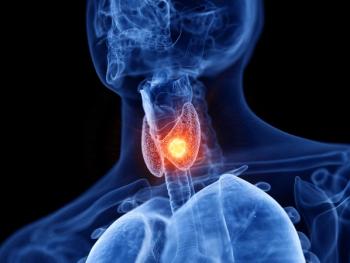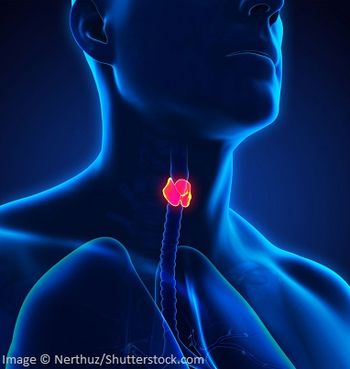
Obesity Associated With Increased Thyroid Cancer Risk
Overweight and obesity are associated with the risk for thyroid cancer. Relations between BMI and cancer risk showed some variation based on tumor histologic type.
A meta-analysis found that overweight and obesity are positively associated with the risk for thyroid cancer. Relations between body mass index (BMI) and cancer risk showed some variation based on tumor histologic type.
“In the past three decades, thyroid cancer has become the fastest growing cancer of all malignancies in the United States,” wrote study authors led by Daniela Schmid, PhD, of the University of Regensburg in Germany. Recent work has suggested that an
The new study examined evidence of a relationship between obesity and thyroid cancer risk, based on 21 published studies and a total of 12,199 thyroid cancer cases. The results were
The analysis showed that overweight individuals (BMI, 25.0 to 29.9 kg/m2) had a relative risk of thyroid cancer of 1.25 compared with normal weight individuals (95% confidence interval [CI], 1.11–1.41). In men only, the relative risk was 1.29 (95% CI, 1.06–1.57), and in women it was 1.27 (95% CI, 1.06–1.53).
The increased risk was stronger for obese individuals (BMI, 30.0 kg/m2 and above) compared with normal weight individuals, with an overall relative risk of 1.55 (95% CI, 1.21–1.99). For men, the relative risk was 1.53 (95% CI, 0.89-2.64), and for women it was 1.57 (95% CI, 1.13–2.19).
Each 5-unit increase in BMI was associated with a 30% increase in risk. Each 5-kg increase in weight was associated with a 5% increased risk, as was each 5-cm increase in waist or hip circumference. Each 0.1-unit increase in waist-to-hip ratio was associated with a 14% increase in thyroid cancer risk.
Notably, obesity was not associated with every histologic type of thyroid cancer. It was positively correlated with papillary, follicular, and anaplastic cancers, but it showed an inverse association with medullary thyroid cancer.
“Our findings imply that maintaining normal weight represents an important strategy for decreasing thyroid cancer risk in both men and women,” the authors concluded. “More epidemiologic research is needed to discern potential variation in the effects of BMI across thyroid cancer histologic subtypes.”
Newsletter
Stay up to date on recent advances in the multidisciplinary approach to cancer.
Related Content


FDA Drops REMS Requirement for Vandetanib in Medullary Thyroid Cancer











































